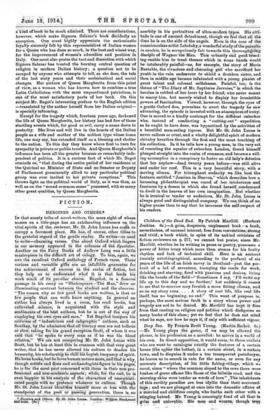FICTION.
HEROINES, INE0 , OTHERS.*
IN that scanty tribe of novel-writers, the mere sight of whose names on a title-page _ha _an _exhilarating influence on the vital spirits of the reviewer, Mr. St. John Lucas has come to occupy -a foremost place. Hu has, of cOtirse, other titleite the grateful regard of the gentle reader. He writes—or used to write—charming verses. One about Oxford which lingers M. our memory appeared in the columns of the Spectator. Another on the Fairy Books of Andrew Lang was a little' masterpiece in the' difficult art of eulogy. To him, again, we owe the excellent Oxford anthology of French verse. These various and versatile gifts are no infallible guarantee for the achievement of success in the realm of fiction, but they help us to understand what it is that lends hie work much of it peculiar charm. Bagehot, in a Lowrie paesage in his essay on "Shakespeare—The Man," drew an illuminating contrast between the student and the observer. "The reason, why so few good books are written, is that so few People that can write know anything. In general an author has always lived in a room, has read books, has cultivated science, is acquainted with the style and sentiments of the beat anthers, but he in out of the ,way of employing his own eyes and ears." Yet Bag,ehot tempers his criticism of "industrious and caligraphic" authors, such as Southey, by the admission that all literary men are not tedious or slow, taking for his grand exception Scott, of whom it Was said that "he spoke to every man as if he was his blood relation." We are not comparing Mr. St. John Lucas with Scott, hut he has at least this in common with that very great writer, that he has never allowed his culture to deaden his humanity, his scholarship to chill his boyish buoyancy of spirit. He loves books, bni lie loves human nature more, and that is why though artidts and dons and archaeologists figure in his pages', he is for the most part concerned with theta in their non-pro- fessional and non-academic aspects ; while, for the rest, he is even happier in his analysis of the characters" of uneophisti- cated people with no pretence whatever to culture. Though Mr, St. John Lucas identifies himself more or less with the standpoint of ,the past or Paseing, generation, there is no • Hera...ande&p,S. John Low. London: 7pliam Blackwood acerbity in his portraiture of ultra-modern types'. His eta. tad° is one of amused detachment, though we feel that all the time be is on the side of the angels. Even in the case of the conscienceless artiat Letchalry,a wonderful study of theparasito in excelsie, he is scrupulously fair towards this thoroughgoing, disciple of Wagner 'the Man. This urlianity end 'good breed- ing enable him to treat themes which in dome trends Would be intolerably painful—as, for eiample, the story of Marla Beatable, the vivacious and charming girl who sacrificed her youth in the vain endeavour to shield a drunken sister, and then in middle age became infatuated with a young pianist of great talent and colossal selfishness. Painful, too, is the theme of "The Diary of Mr. Septimns Jervoise," in Which the heroine is robbed of her lover by her friend; who never meant to Marry him, but merely wished to display her irresistible powers of fascination. Viewed; however, through the eyes of a gentle Oxford don, powerless to avert the tragedy he sin' advancing, the episode' is invested with an atmosphere& irony'. One is moved to a kindly contempt for the diffident onlooker who, instead of conducting a "outting-ont" expedition as he ought to have done, Was hypnotized by the activities of a beautiful man.eating tigress. But Mr. St. John Lucas is never callous or cruel; and a wholly delightful spirit of modern chivalry breathes through the first and the most touching Of his collection. In it he tells how A yoking man, in the very set of resenting the squalor of suburban London, found himself plunged straight into the realm of romance; and became a will. tag accomplice in a conspiracy to foster an old lady's delusion that her nephew—dead -twenty yeara_before—was still alive and under her roof. This is is very beautiful story, with a moving climax. For triumphant. audacity we like best the fantasia entitled ", Jeminut in Heaven," which describes how a, harassing philanthropist was cured of her intolerance and fussiness by a dream in which she found herself .condemned to dwell in the heaven of her own imagination. , But whether he is ironical or .tender or audacious, M. ,St.. John Lucas is always good and distinguished company. yiTe ca.n,thinic of no higher praise than to say that he increases the sell-reaped of his readers.










































 Previous page
Previous page